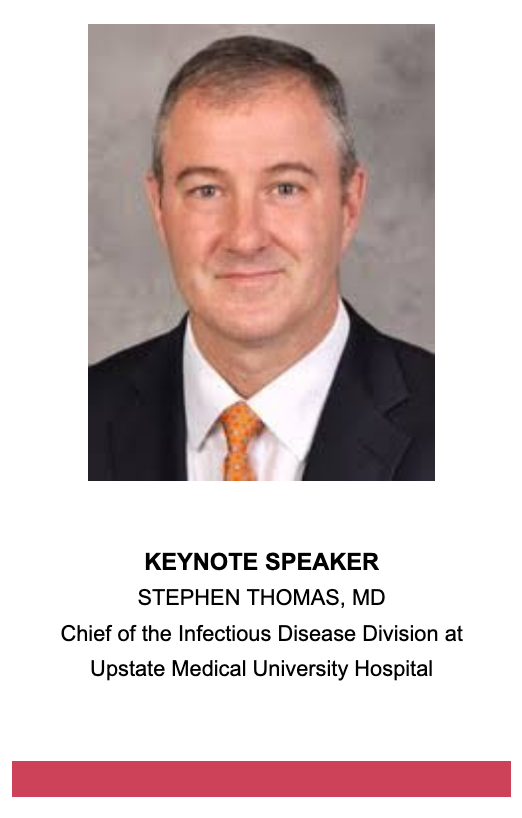Chief investigator in clinical study shares insight with local doctors
By Marnie Muñoz
Pfizer’s research results and panel recommendation from the Food and Drug Administration have Dr. Stephen Thomas feeling cautiously optimistic about the Pfizer vaccine’s potential to help bend the COVID-19 pandemic curve.
Thomas, who is lead principal investigator for the Pfizer-BioNTech COVID-19 vaccine trial and chief of infectious disease at SUNY Upstate Medical University, discussed key developments in the companies’ research during Onondaga County Medical Society’s annual meeting held virtually Thursday evening.

An FDA advisory panel provided its recommendation for the Pfizer vaccine earlier the same day in a nine-hour meeting Thomas participated in. The FDA’s recommendation and likely authorization within the coming days position the United States to inoculate healthcare and other front line workers as soon as next week.
“Hope is around the corner,” said Onondaga County Health Commissioner Dr. Indu Gupta, adding that everyone should still remain vigilant about preventative measures to slow the virus’ spread. “There’s a saying that ‘Vaccine does not save lives, vaccination does.’ I think we all have to remember that.”
Scientists and government leaders now face the logistical challenge of inoculating millions of people as fast and safely as possible, New York Lt. Gov. Kathy Hochul said in a video statement to the group.
But precedent and pandemic fatigue have also eroded the public’s trust in authorities, especially politicians, she said. As a result, she believes doctors will need to maintain their credibility within communities to win the country’s war with COVID-19.
Thomas finds reassurance in the rigorous testing and research protocols competing companies have followed throughout the year.
Pfizer’s phase three trial randomly assigned the company’s vaccine or a placebo to approximately 43,000 volunteers in the United States, Argentina, Brazil and South Africa earlier this year. Doctors administered a first dose of the vaccine to participants on the first day of the trial and a second dose on day 21.
Scientists carefully observed participants to record any adverse effects as the trial progressed, Thomas said.
Among participants with no history of the virus, only eight people who received the vaccine contracted COVID-19, while 162 people with the placebo got the virus. Based on that data, Pfizer researchers can claim that the vaccine is 95 percent efficient, Thomas said.
The vaccine’s efficacy also remained relatively consistent for people who previously had COVID-19, people with varying comorbidities, people across almost all age groups and people of different races and ethnicities, he added.
A 95 percent confidence interval is both high and promising, although data interpretation should still be taken with a grain of salt to account for the data’s limited scope and overall lack of diversity among trial participants, Thomas said.
Most of the trial’s volunteers were white, while only 28 percent were Hispanic or Latinx, 9 percent were Black and 4 percent were Asian. Because these groups were smaller than the pool of white volunteers, Thomas noted the vaccine’s recorded efficacy percent could be skewed.
“It’s unfortunate because these groups, as we know, bear a much higher burden of illness and hospitalization,” Thomas said.
Pfizer’s research still has remaining questions which are hoped to be answered as the two-year trial continues.
Nevertheless, Thomas says the vaccine shows potential to protect people from becoming infected with COVID-19.
Scientists currently expect the United States to make more than one vaccine available before the end of 2020 and possibly three widely available by the end of 2021.
Hochul conveyed to the group that she and Gov. Andrew Cuomo have confidence in Onondaga County Medical Society (OCMS) and all of New York’s healthcare workers to stay strong until then.
Also during OCMS’s annual meeting, 10 members who passed away this year were recognized, including former society president Dr. Duane Cady. The group also honored Gupta, and Onondaga County Executive Ryan McMahon for each one’s contributions to the community throughout this year.
OCMS also posthumously awarded Dr. Adeline Fagan, a young doctor from Central New York who died of COVID-19 in September after working as a resident in a Houston hospital.
Though challenged by the pandemic, Onondaga County leaders and OCMS members made significant impacts on healthcare delivery in New York state, said Dr. Bonnie Litvack, president of the Medical Society of the State of New York.
“When we stand together and speak with a collective voice,” Litvack said, “we are stronger and accomplish much.”
 The Stand
The Stand

